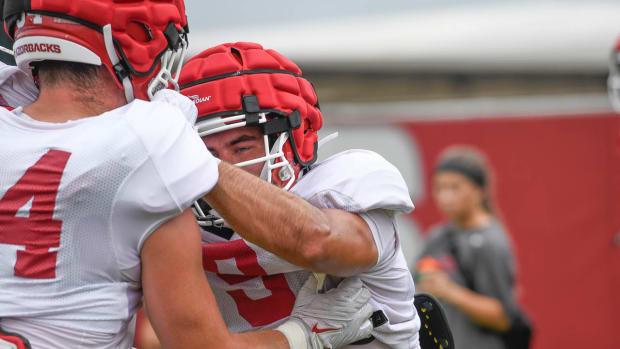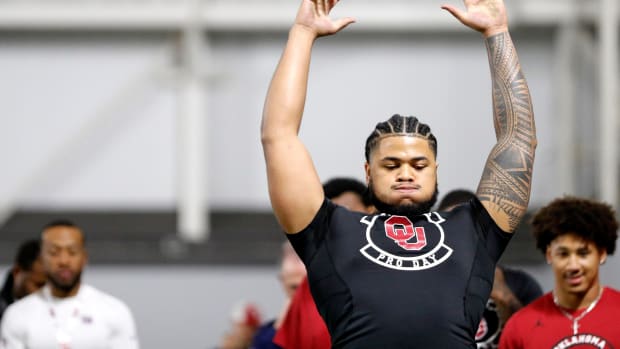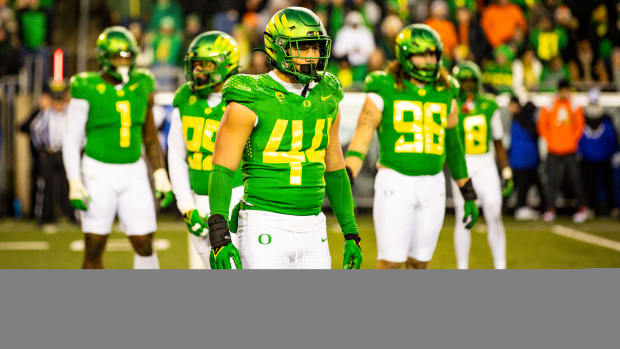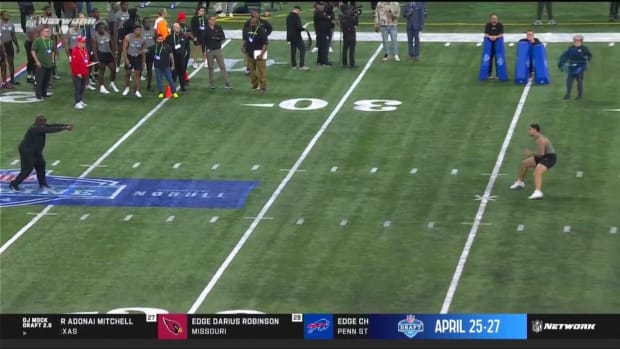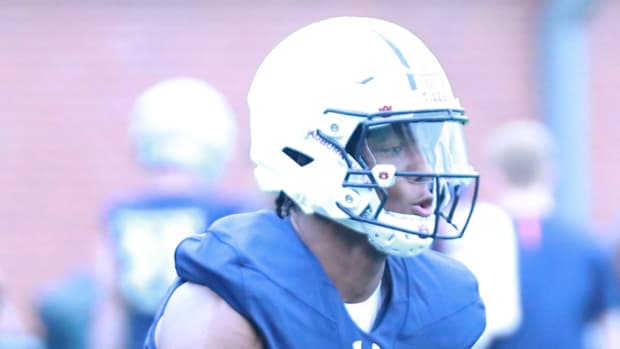Series of the strange: Florida, Georgia and the bizarre history of the World's Largest Outdoor Cocktail Party
When Georgia coach Mark Richt cracked the door Wednesday on the possibility of a quarterback change prior to Saturday's meeting with Florida in Jacksonville, Fla., it only strengthened the possibility that this is going to be one of those editions of the World's Largest Outdoor Cocktail Party.
"All I can tell you is we've been repping more than one guy with the ones," Richt told reporters. "And we're going to continue to do that."
This might merely be gamesmanship on Richt's part. If he plans to keep starting Greyson Lambert but can make Florida's defensive coaches waste practice time preparing for Faton Bauta, that helps the Bulldogs. Or Richt could absolutely be planning a quarterback change. After all, he lost the 2005 version of this rivalry to an inferior Florida team that had scrapped its entire offense during the bye week between facing LSU and Georgia. That's the sort of thing that happens often in this series. Coaches come up with game plans that completely befuddle the opponent. Or coaches completely lose their minds. Or one team performs a miracle.
The Bulldogs (5–2) and Gators (6–1) will square off Saturday for supremacy in the SEC East. Georgia, the division's best team on paper since Tim Tebow left Florida following the 2009 season, has only won the division twice in that span. A win Saturday would put the Bulldogs in control of their own destiny, though they would still need to beat Kentucky and Auburn to book a trip to Atlanta. For the Gators, of whom nothing was expected coming into coach Jim McElwain's debut season, a victory would all but clinch the division. Florida would need one more win or one Vanderbilt loss, and the Gators could provide that win and that loss when the Commodores come to Gainesville next week.
The history of the series suggests something odd will happen while figuring out who controls the East. Here are five examples of the weirdness that takes place when the Bulldogs and Gators invade Jacksonville.
1966
The Gators were 7–0 and had just beaten Auburn in a nationally televised thriller that essentially clinched that year's Heisman Trophy for quarterback Steve Spurrier. All they had to do was beat Georgia, and they'd win the first SEC title in school history. (Well, they would share it with Alabama. But for title-deprived Florida, that would have been plenty.)
However, third-year Georgia coach Vince Dooley had a plan to stop Spurrier. Dooley played his cornerbacks one-on-one against Florida's receivers and turned his front seven loose on Spurrier. The Bulldogs' defense seemed to know exactly what the Gators were doing on every play—especially safety Lynn Hughes, whose pick-six of Spurrier in the fourth quarter broke a 10–10 tie. Meanwhile, Georgia defensive tackle Bill Stanfill terrorized Florida's linemen and backs. "He almost killed every one of us," Florida center Bill Carr, who would later become the Gators athletic director, told the Gainesville Sun in 1990.
Georgia surged to a 27–10 win, crushing Florida's title dreams again. It would be 18 years before the Gators would finally finish first in the SEC. (They would be stripped of that title for cheating and didn't win their first official SEC title until 1991.)
1976
This series has had its share of excellent coaching decisions, but it also has had some incredibly foolish ones. Even Kevin Kelley, the Arkansas high school coach who rarely punts, would have likely wondered what on earth Florida coach Doug Dickey was thinking had Kelley not been a second-grader at the time that this game was played.
With Florida leading 27–20 in the third quarter, Dickey sensed the momentum slipping away and decided to go for it on fourth-and-inches from his own 29-yard line. Earl Carr took a pitch and delivered a vicious stiff-arm to Georgia's Johnny Henderson, but Henderson hung on to one of Carr's arms and dragged him down for no gain. Georgia quickly scored and rolled to a 41–27 win.
"Georgia did a super job in the second half and we as coaches did a miserable job. We didn't get outplayed. We got outcoached," Dickey told reporters after the game. "The team did a super job of preparing for this game, but this is the worst job of coaching we have ever done."
In Florida circles, this meeting is always referred to as Fourth and Dumb.
1980
The Bulldogs had the best player in the country (freshman tailback Herschel Walker) and appeared to be on their way to playing for a national title, but Florida statistically dominated them for 58 minutes. All looked lost when Florida downed a punt at the Georgia eight-yard line with a one-point lead and just 1:35 left. Two plays later, Georgia faced third-and-11 from the seven. Bulldogs quarterback Buck Belue had completed 7 of 16 passes for 51 yards. He dropped back and got flushed from the pocket. Then he threw a curl to Lindsay Scott. We'll let legendary Georgia play-by-play man Larry Munson take it from here with the greatest radio call in college football history. (RIP Larry, and RIP that steel, metal chair with about a five-inch cushion.)
[youtube:https://www.youtube.com/watch?v=bjNxWAdR_sQ]
2005
First-year Florida coach Urban Meyer had shed tears in his postgame press conference at LSU after his team couldn't cross its own 30-yard line in four fourth-quarter possessions. In the Gators' 2005 losses to Alabama and LSU, the vaunted spread option Meyer had brought from Utah had flopped. It had become obvious he didn't have the players he needed to run it.
So, during the bye week between the LSU game and the meeting with fourth-ranked Georgia, Meyer tossed most of his offense. He reinstated the fullback position that he had eliminated upon his arrival, moving a former walk-on named Billy Latsko back to offense from linebacker and creating a folk hero in the process. Meyer cribbed plays from Arkansas, which had lost by three at Georgia a week before the Gators and Bulldogs met. Meyer also put in plays that looked shockingly similar to ones Florida had run under coordinator Larry Fedora in 2004.
Georgia still likely would have won had quarterback D.J. Shockley been healthy, but with backup Joe Tereshinski starting, the Gators stood a chance. The Bulldogs' defense looked stunned by an offense that didn't resemble anything Florida had run all season. The Gators scored touchdowns on their first two possessions. They never scored again, but their defense held fast. Florida's 14–10 win was probably the most important of Meyer's tenure in Gainesville. To this day, I have never seen a coaching staff happier about a win—and that includes every national title game I've covered. It proved Meyer could adjust his offense to work against the best of the SEC, and the preparation for that game laid the foundation for the offense the Gators would use while winning the national title in 2006.
"Is that what we want to become? No," Meyer said a day after beating Georgia. "Do we want to win games? Yes. That was the decision made. We had to win that game. I'm comfortable with winning."
2014
Last year's Cocktail Party produced one of the most bizarre box scores in recent memory, and the behind-the-scenes drama at Florida made it even weirder.
Florida's administration had all but decided to fire coach Will Muschamp after a 42–13 home loss to Missouri on Oct. 18. All that remained was the inevitable defeat by Georgia and the deed would be done. There was only one problem with that plan: Muschamp didn't lose to his alma mater for a fourth consecutive season.
The Gators completed three of six passes. Their biggest play came on a fake field goal executed by a walk-on holder who worked a shift bagging groceries at a Publix supermarket near campus the next day. Yet Florida dominated. The Gators ran 60 times for 418 yards, humiliating Georgia's defense and handing the SEC East title to a Missouri team that Georgia had crushed 34–0 on the road three weeks earlier.
"We actually did have a plan to throw some passes in the game," Muschamp told reporters after Florida's 38–20 win. "I know I'll still disappoint a bunch of Florida fans with it, but why stop running the ball when you're able to gain yards?"
Muschamp was fired two weeks later after a loss to South Carolina. Still, after four games as a player and four as a coach, his place in the bizarre history of the World's Largest Outdoor Cocktail Party was secure.


